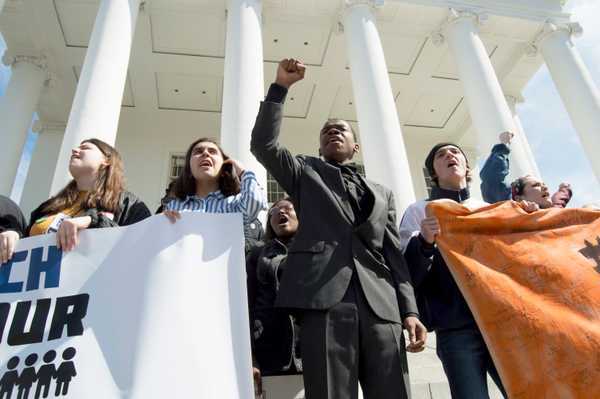There are many topics that get brought up during presidential debates. As a result of this, most have their one time in the spotlight and then are overshadowed by a flashier, more politically polarizing issue. The issue with this is that this occasionally leads to people hearing incorrect information about topics that are realistically important to their wellbeing, and in some cases are even drawn to voting for candidates who do not understand at all what they are talking about, This week, the topic is quantitative easing, a term that does not ring many bells to people who don’t focus heavily on monetary policy in the United States.
The issue with this topic lies in the fact that very few people realistically understand what quantitative easing entails. Due to this problem, it was easy in the 2016 election for presidential candidates to mistakenly claim it is something else than what it realistically is, as well as claiming quantitative easing can solve problems that it simply cannot through people that realistically have no control over it. Before going forward with this article, it is important to disclose it is an opinion piece, and this week in particular I will be focusing on tearing down 2016 presidential candidates and their parties for misunderstanding what is really a simple topic. This week in particular, the offender is 2016 Green Party nominee Jill Stein.
Generally third party candidates can more or less get a pass in regards to legitimate criticism given their lack of media attention and relatively small voter bases, but given that during the last election Jill Stein argued that she was the best alternative for those who had supported Bernie Sanders in the primaries, and given the fact that when the polls were counted she had been voted on by 1,207,141 people, it is best to do some fact checking into what I would firmly say is one of her more ludicrous claims, which came earlier in the general race: that we should use quantitative easing to cancel student loans through presidential decree.
To start, what is quantitative easing? The technical definition used by those who study economics is that quantitative easing is the introduction of new money into the money supply by a central bank. It is a monetary tool used by the Federal Reserve to artificially lower interest rates in the market and increases the monetary supply, which is a move that ideally increases lending ability for banks that receive the funds. This, in times of economic recession, is a measure that attempts to spur growth in the overall economy.The most notable usage of this tool was in 2008 after the collapse of the housing market. According to research done by the BBC, from 2008-2010, the Federal Reserve bought around $2.1 trillion of treasury bonds and mortgage-backed securities. This is something of a generally agreed upon success, and the resulting interest was paid back as well to the Fed. Further rounds of quantitative easing have occurred since then (two rounds to be exact) and have been less successful in the end goal of increasing economic growth, which has led to some debate over whether or not it is a truly effective monetary tool.
Jill Stein, in her commentary, has time and time again shown a fundamental lack of knowledge in not only this topic, but also monetary policy as a whole. To start, it is important to focus on Stein’s comment about the president even having power to use quantitative easing. Unfortunately for her, but luckily for own nation, only the Federal Reserve has the power to enact monetary policy. Government officials like congress and the president have power only over fiscal policy, which is entirely different. To clarify, fiscal policy involves the government changing tax rates and levels of government spending, acts that are focused on influencing aggregate demand in the economy. Monetary policy on the other hand is the job of the Federal Reserve, and involves changing the interest rate to influence the money supply. This makes sense when you consider that the last thing the nation would want to have happen is to give our government the ability to create money whenever they so please. The resulting effects would be devastating to the U.S. economy. Given that information, the president has no power to even enact quantitative easing. Jill Stein’s entire argument, as a result, begins to unravel.
The unraveling does not stop there, however, when you think about what Stein wants to use quantitative easing for. What she effectively wants to do is use the Federal Reserve to buy student loans to effectively cancel them. Two things stand out as being wrong about this plan. For one, quantitative easing cannot even be used in that fashion. To assume one can use it to buy student debt is simply illogical, and if it were used in such a fashion, it would do nothing more than increase inflation due to the government having to suddenly pay off the loans through the printing of more money. Secondly, even if the act was performed the way Stein wants it to happen, the debt is far from cancelled, but rather transferred onto the federal government. Though appealing on the face of it to many who want the government to pay for college, this does nothing to create a tax plan compensating for the losses accumulated when the government fronts the bill, rather putting the government into a financial hole with no way of getting out with the hopes that production will increase amongst students as a result of cancelled debt.
In short, the monetary policy known as quantitative easing is complex but easy to understand when it is explained in basic terms. This, like other topics that were brought up throughout the election was drastically under reported, and as a result were able to be unfairly twisted by politicians who themselves knew nothing about it. It is important to stay informed an stay educated on abstract topics, for they sometimes contribute to major political plans. Quantitative easing is something that is important for Americans to understand, because it’s usage, and its effects, affect the nation as a whole for years after. With this knowledge, it becomes easier to debunk political lies, something we should all want to do.





















